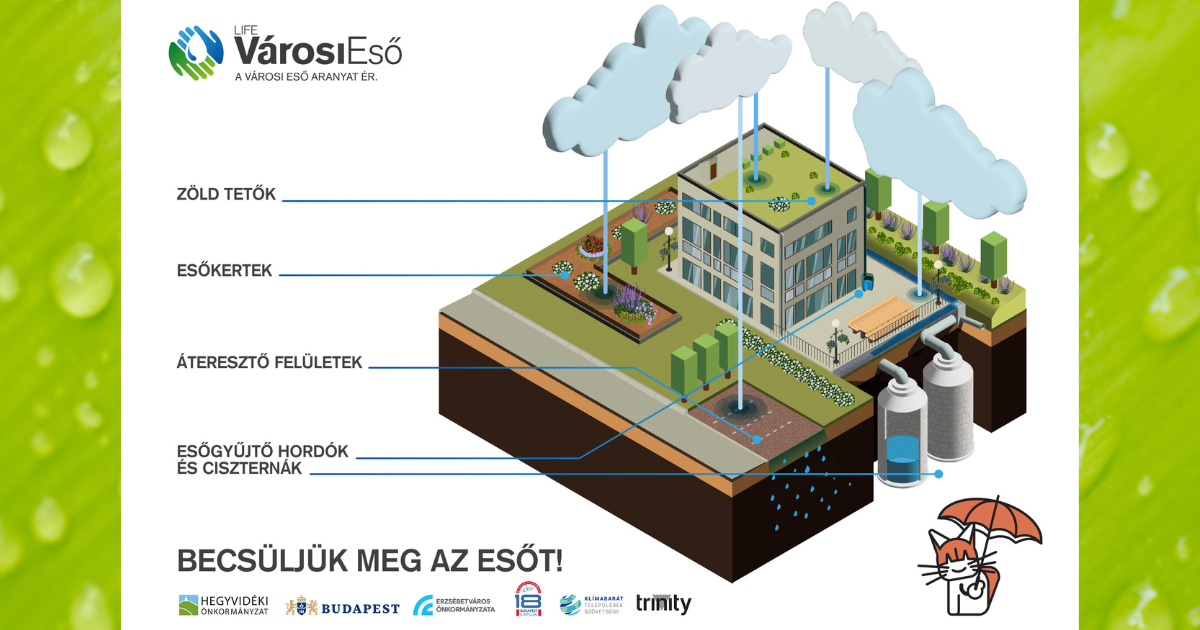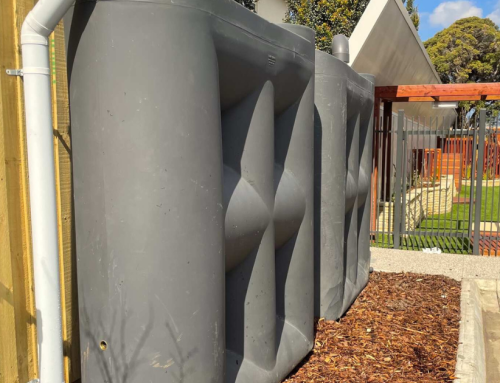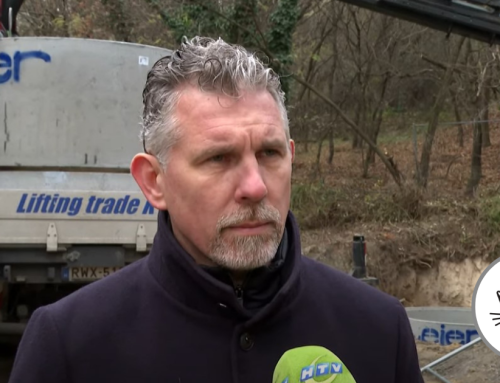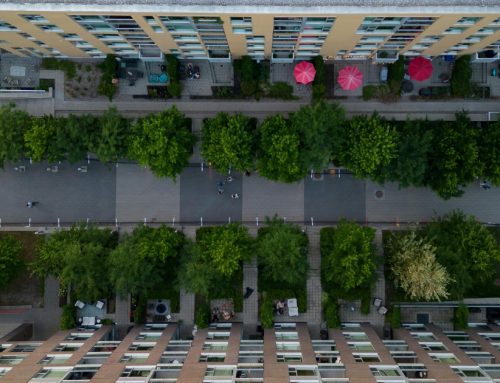
Indul a Városi Eső Esőmentő kampánya!
A klímaváltozás hatásai mindennapjainkban egyre érezhetőbbek, különösen a városi környezetben, ahol a szélsőséges időjárási események – például a heves esőzések és az egyre gyakoribb aszályos időszakok – súlyosan érintik az infrastruktúrát és az életminőséget. A csapadékvíz-gazdálkodás terén történő szemléletváltás ezért kulcsfontosságú az önkormányzatok, az intézmények, a vállalkozások és a lakosság számára egyaránt.
A hagyományos megközelítés hátrányai
Az elmúlt évtizedekben a városi csapadékvíz kezelésének alapvető célja az volt, hogy a vizet a lehető leggyorsabban elvezessék a területekről. Ez a megközelítés azonban számos problémát eredményezett. A szennyvízcsatornák túlterhelése, az árvizek gyakoriságának növekedése és a talajvíz utánpótlásának elmaradása mind a hagyományos rendszerek hiányosságaira mutatnak rá. Ezek a problémák nemcsak a környezetet terhelik, hanem jelentős gazdasági károkat is okoznak.
Új irányok: Természetes megoldások előtérben
A szemléletváltás egyik legfontosabb eleme a csapadékvíz-gazdálkodás fenntartható megközelítése, amely a víz helyben tartására, hasznosítására és a természetes vízkörforgás helyreállítására összpontosít. A természetközeli megoldások – például a zöldtetők, esőkertek, áteresztő burkolatok és vízgyűjtő rendszerek – nemcsak hatékonyabbá teszik az esővíz kezelését, hanem hozzájárulnak a városi mikroklíma javításához és a biodiverzitás növeléséhez is.
Önkormányzatok: Példamutatás és hosszú távú tervezés
Az önkormányzatok szerepe kiemelkedő a szemléletváltásban. Ők alakítják a városfejlesztési terveket, és biztosítják az infrastruktúra fenntarthatóságát. A csapadékvíz-gazdálkodás innovatív megoldásainak beépítése nemcsak a városok élhetőségét növeli, hanem hosszú távon költséghatékonyabb is. A jó példák – például az esőkertek létrehozása közterületeken – ösztönzőleg hatnak a lakosságra és a helyi vállalkozásokra is.
Intézmények: Oktatás és tudatformálás
Az oktatási és egészségügyi intézmények számára nemcsak az infrastruktúra átalakítása fontos, hanem a szemléletformálásban betöltött szerepük miatt is. Az iskolák például bemutathatják a fiataloknak a fenntartható vízgazdálkodás fontosságát, míg a kórházak és rendelők zöldítése példát mutat a fenntarthatóság gyakorlati megvalósítására. Az egészségesebb mikroklíma pedig közvetlenül is pozitívan hat a jól-létünkre és az egészségünkre.
Vállalkozások: Innováció és felelősség
A vállalkozások számára a fenntartható csapadékvíz-gazdálkodás új lehetőségeket kínál az innováció és a költségcsökkentés terén. Az ipari parkokban és kereskedelmi épületekben alkalmazott zöldtetők vagy esővíz-újrahasznosító rendszerek egyszerre növelik a versenyképességet és csökkentik az ökológiai lábnyomot.
Lakosság: Tudatosság és közösségi cselekvés
A lakosság részvétele nélkül a szemléletváltás nem valósulhat meg. Az esővíz gyűjtése, a vízáteresztő burkolatok használata és a háztartási esőkertek létrehozása mind olyan lépések, amelyekkel az egyének is hozzájárulhatnak a fenntartható jövőhöz. A közösségi programok és kampányok pedig tovább növelhetik az emberek elköteleződését.
Összefogás a fenntartható jövőért
A szemléletváltás a csapadékvíz-gazdálkodás terén nemcsak a természeti környezet védelmét szolgálja, hanem hozzájárul a városok élhetőségéhez, a gazdasági stabilitáshoz és a társadalmi jóléthez is. Az önkormányzatok, intézmények, vállalkozások és a lakosság közös felelőssége, hogy felismerje: a fenntartható vízgazdálkodás alapvető feltétele annak, hogy a következő generációk is élvezhessék a természeti erőforrásokat és az egészséges városi környezetet.
A Városi Eső projektről

A Hegyvidéki Önkormányzat (XII. kerület) vezetésével, Erzsébetváros (VII. kerület), Pestszentlőrinc-Pestszentimre (XVIII. kerület), a Fővárosi Önkormányzat és számos más szakmai partner együttműködésével 2021 és 2025 között részben uniós forrásból megvalósuló “LIFE – Városi Eső” projekt fő célja a városi klímaadaptáció támogatása csapadékkezelés terén a zöld és kék infrastruktúrák közötti szinergiák megtalálásával és ezek erősítésével.
A természetközeli és technológiai megoldásokat egyesítő megközelítés révén hatékonyan csökkentjük a hirtelen lezúduló csapadék káros következményeit. Sérülékenységvizsgálatokkal azonosítjuk be a beavatkozási pontokat a három budapesti partnerkerületben, majd különböző demonstrációs elemekkel mutatjuk be a szakma, döntéshozók és városlakók számára a városi esővízkezelés lehetőségeit. Célunk, hogy a célcsoportjaink a projekt végére az esővizet értékként kezeljék, ugyanakkor tisztában legyenek és alkalmazzák is a hirtelen lezúduló csapadék káros következményeit csökkentő és az ezeket megakadályozó megoldásokat.







Hagyj üzenetet